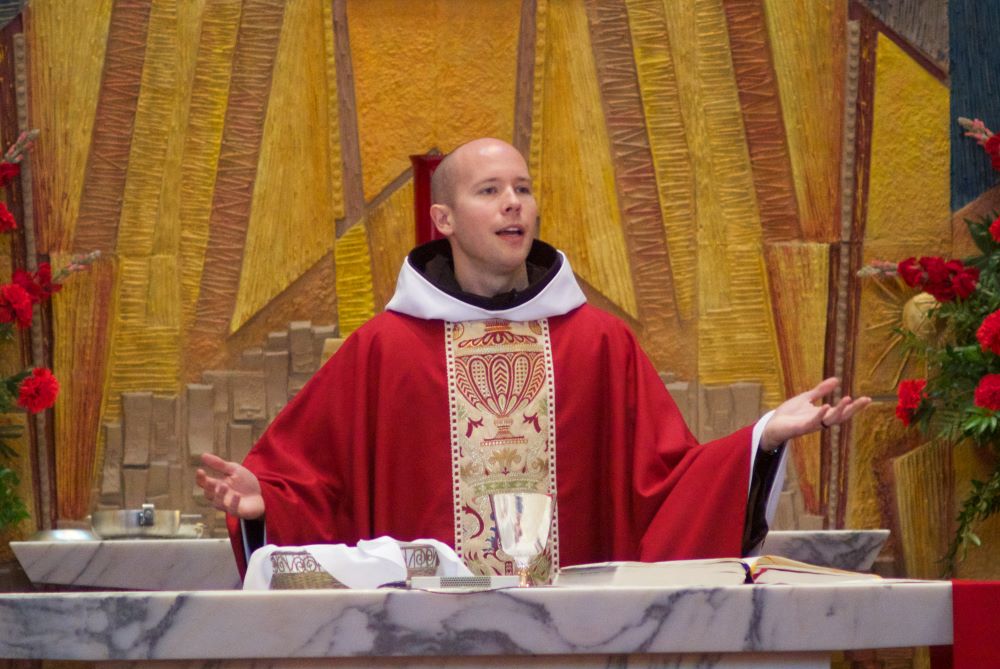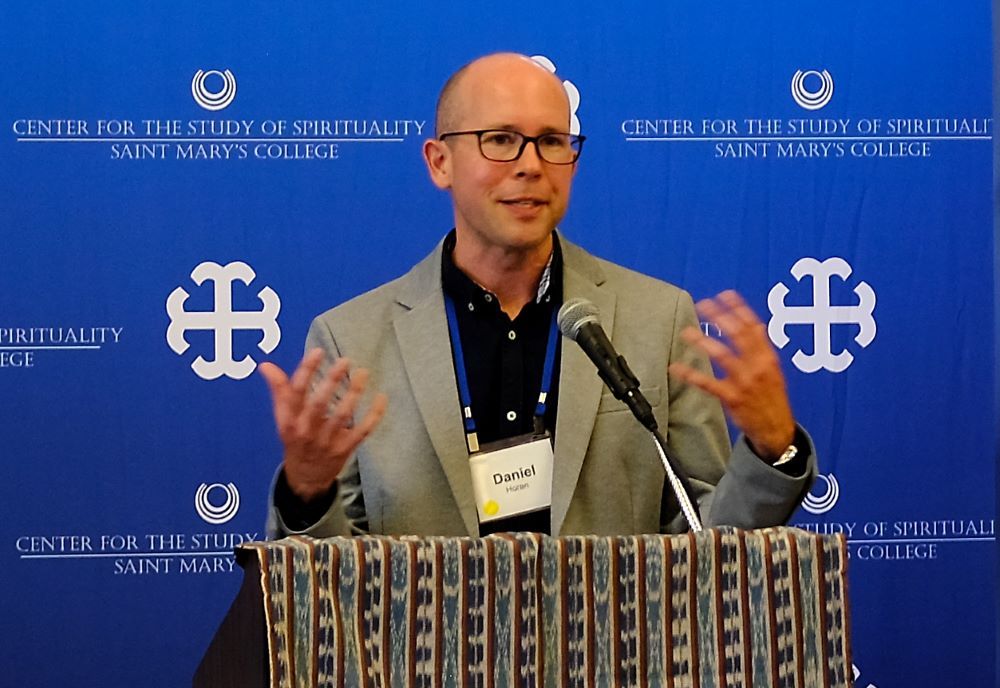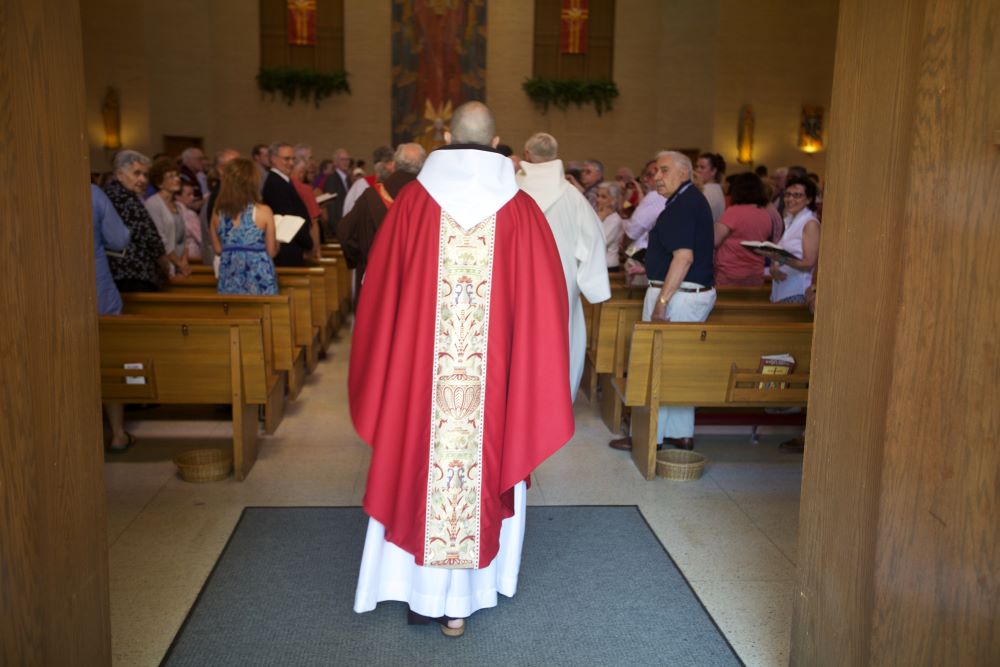
Franciscan Fr. Daniel P. Horan celebrates Mass in May 2012. Horan has announced his departure from the Franciscan order. (The Catholic Sun/Charles Wainwright)
After a substantial period of prayerful discernment, I have concluded that I am no longer called to remain a friar minor. I share this news publicly, with the support of my religious superiors, on an important and symbolically significant day for the Franciscan family.
Today marks one of the most solemn feasts in the Franciscan calendar: the Transitus of St. Francis of Assisi. It is a commemoration of his death on the evening of Oct. 3, 1226, and it is a time when the Franciscan family gathers to mark not just his death, but also his passage to new life in Christ. The Latin word transitus is significant because it reflects Francis' belief that death was not an enemy nor was it an end. Instead, Francis believed that bodily death was part of God's plan for creation and not something to be feared; he even called death his "Sister." Using transitus to refer to death denotes a transitional or liminal moment between two forms of life, a continuation of what has begun in this earthly life is now carried on into the mystery of the next life.
In many ways, this understanding of his own physical death aligns with Francis' lifelong belief in the experience of ongoing conversion. It's difficult to clearly delineate chapters in his life or identify sharp or immediate shifts in his life, as the early hagiographers were fond of doing. Francis' own life bears witness to the subtle changes and growth along a lifetime of spiritual journeying that can be quite instructive as they are, at times, mysterious.
Francis often changed his mind, such as when he approved of formal education for the brothers after years of objecting to it. His understanding about community life changed as witnessed in the development of his earlier rule (the Regula non bullata), which took shape over more than a decade. And he shifted his expectations about what God was calling him to do in this life, such as when brothers started following him and even a woman named Clare joined the community — neither of which he sought on his own.
My state of life, as the church often refers to it, may have changed, but my faith in God has not.
All these and other instances in Francis' life represent another kind of transitus, a transition from one way of thinking or being to another, while maintaining some continuity with what came before. In each chapter or episode in his life, it was his attentiveness to the guidance of the Holy Spirit — often in unexpected and creative ways — that ushered in this new experience or adjustment to what had been before. Francis' obedience to the Spirit stemmed from his belief that, as he is remembered to have said, the Holy Spirit was the "true Minister General of the Order."
We can all relate in some way to Francis' process of discernment and experience of transitus. How many of us know the feeling of uncertainty about where God is calling each of us, the fear of the unknown, the desire to do what's right, the reevaluation of big and small decisions, the presence of tensions in life or even the reconsideration of one's life paths? Likewise, many of us can relate to the challenge and blessing of our own experience of transitus, that transition from a former to a new way of life.
The significance of transitus in the Franciscan tradition has always meant a lot to me, but at this moment in my own life it has an especially powerful resonance as I experience a significant transitus in my own vocational journey.
This personal transitus is reflected in my decision, in complete freedom, to leave the Franciscan order and petition the Holy See to be dispensed of the obligations of Holy Orders. This was not an easy decision, nor did I approach this discernment lightly. I have arrived at a place of peace and joy, certain that God has been with me each step of the way and continues to guide me now.
For a number of years already, I have been reflecting on where the Holy Spirit is calling me and what that might mean for my vocation to religious life and priestly ministry. Like so many people in all walks of life, the global pandemic was a particular catalyst for this discernment, providing an occasion for deeper reflection on key and even existential issues. I was wrestling with what was most important in life, where my passions rested, and where and how God was calling me to serve the church and world. In addition to spiritual direction, community life and conversations with trusted dialogue partners, I was also blessed to see an excellent psychologist who helped me process these important life questions and understood the nuances of religious life and ministry. Over time, it became clear to me that I needed to dedicate time and space for deliberate discernment.

Franciscan Fr. Daniel P. Horan speaks during a July conference on Teresa of Avila at the Center for the Study of Spirituality at Saint Mary's College in Notre Dame, Indiana. Horan, a regular NCR columnist, has announced his departure from the Franciscan order. (Courtesy of the Center for the Study of Spirituality)
During this past year, with the full support of my religious superiors, I embarked on a formal time of vocational discernment, during which I have remained a friar in good standing and maintained ministerial faculties. Over this time, I weighed these matters before the Lord, while remaining as open as possible to whatever direction God was leading me. This dedication to prayer and dialogue, reflection and discernment has resulted in the assurance that I have pursued this process with integrity and transparency before God and my religious community.
I know that some people will want to know more about my discernment and the reasons why I have come to this decision, and I do plan to share more about my experience and vocational journey later. For now, it is important for me to convey that this is a good thing for me personally and spiritually.
Throughout this journey I have been renewed in my Catholic faith and love of the church. My departure from religious life and retirement from sacramental ministry is in no way a sign of a lack of faith or belief. Instead, it is an affirmation of the dynamic and often surprising direction of the Holy Spirit, whom the psalmist describes as the one sent to "renew the face of the earth" (Psalms 104:30). I feel renewed in my baptismal calling as part of the Body of Christ, willing to serve the church and world in new ways. My state of life, as the church often refers to it, may have changed, but my faith in God has not.
My discernment and subsequent decision should not be seen as a sign of rejecting religious life broadly or professed life in the Franciscan tradition particularly. On the contrary, I have nothing but the greatest love and respect for my friar brothers who heed the Spirit's call in their life to remain within the community. My personal journey is simply that: one individual's experience of ongoing conversion and discernment, and not a model or prescription for anyone else.
I have communicated to my brother friars that I do not desire to be a stranger, that I appreciate and cherish the many close friendships I have among my Franciscan family. And I am eternally grateful for the many years that I was a part of that special family. I leave this state of life on good terms with the Franciscan order, and I am grateful for the love, respect, understanding and support from my religious superiors. I feel blessed to have been a friar minor during the two decades God called me to that state of life. While I will no longer be a Franciscan friar, I will always be a Franciscan at heart and in spirit.

Franciscan Fr. Daniel P. Horan stands in procession before celebrating Mass in May 2012. Horan has announced his departure from the Franciscan order. (The Catholic Sun/Charles Wainwright)
Obviously, this vocational transition will affect my life in both personal and public ways. I will no longer be identified as a Franciscan friar or minister as a Catholic priest. Therefore, after many years of celebrating the sacraments publicly, I will no longer be able to serve the church in this way. Part of me mourns the loss of this ministry, but I have come to a place of peace and understanding about this.
However, many things will stay the same. For example, I will remain a faithful Catholic, who loves the church and the people of God. I will continue to be a professor of theology and philosophy, who teaches, researches, writes and lectures. I am also delighted to share that I will continue to serve as a regular columnist here at NCR.
This is indeed a time of transition for me, a real transitus from one form of life to another. I am sure that there will be plenty of opportunities for me to share more of my story at NCR and elsewhere. In the meantime, I am reminded of something that St. Francis of Assisi is remembered to have said to his brother friars not long before he experienced his ultimate earthly transitus.
Looking back over his life and reflecting on the unique way that God called him to live in the world in different ways at different times throughout his own spiritual journey, Francis said: "I have done what is mine to do; may Christ show you what is yours." At the heart of his own vocation was the recognition that Christ calls each of us to follow him in distinct ways. Christ continues to show me what is mine to do, and I pray that Christ show you what is yours as well.
Advertisement








